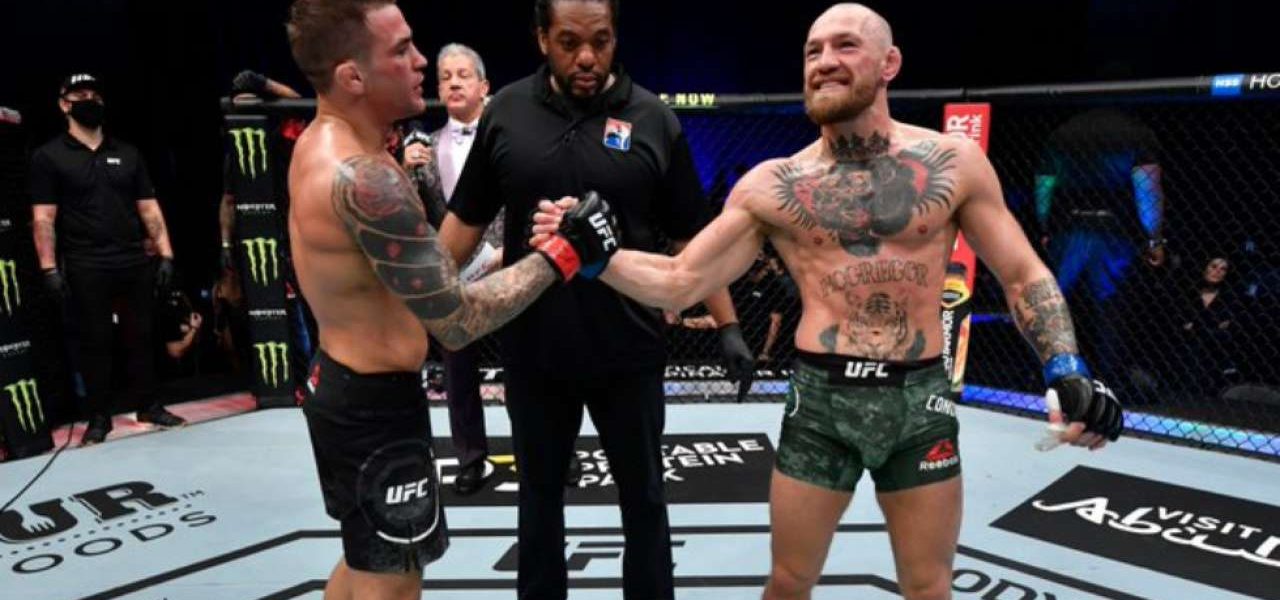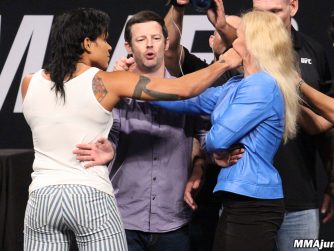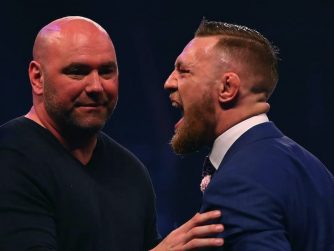Barbaric. Feral. A mindless hippodrome of sadism. Perhaps a more recognisable term, “human cockfighting” coined by former US Senator John McCain, a proponent of the sweet science who found it onerous to notice the irony. Whilst it may seem baffling how a cab driver turned self-proclaimed ‘200-0’ fighter Thomas Ramirez losing in… convincing fashion to Don Frye at UFC 8 would engender such condemnation, the early years of the UFC seemed to merit the comments of the carping western audience who were dipping their toes into an alien sport.
Since then, the UFC successfully revamped into a more telegenic product with the introduction of governed regulations and weight divisions. Gone were the days of behemoth heavyweights going up against crafty lightweights all to figure out the superior martial art.
The stigma however, stuck. Despite its evolution and breakthrough into mainstream, a comment about its bestial nature is never far away and while the sport’s epicentre lies in violence, the process transcends the means. Virtuosity in multiple disciplines is the norm, learning curves are steep, and opportunities are fleeting. Fighters continually subject themselves to brutal weight cuts while mentally transporting themselves to a detached realm with their path in sight. Not to mention the time away from family and the years spent perfecting their art. The demands seem endless, which renders every decision laden with repercussions that fail to strike immediately for the audience, lending to cursory opinions and conversations. ‘The process’ though experienced by a select few speaks volumes about the basis of the sport. The journey of four combatants define its beauty.
“Born on the mat”

With life spawns boundless possibilities with untold potential; unless your father has had multiple Vale Tudo fights, then you’re becoming a fighter.
Hailing from Varginhas, a place one is familiar with if they have their tin foil hats on, Amanda Ribas started out under the tutelage of her father Marcelo Ribas who had sown the seeds of a mutual passion for martial arts. Despite the early jitters, the Brazilian found herself training Judo to ameliorate her jiu-jitsu at the age of 12. The culture of fighting emanated from the household as Ribas honed her skills before moving to Belo Horizonte at a staggering age of 14. Championships and accolades stood testament to not only her ability, but her lineage as well. Her road to Olympic glory met a harrowing hurdle as an injury to her ACL, meniscus, and knee-cap seemingly brought matters to a standstill. Resentment would be an understandable emotion, leaving a sour taste for even the most resolute fighters. Amidst the clouds of uncertainty, a massive decision lay ahead for the Ribas family. A gentle nudge in the right direction arrived in former UFC fighter Carlos Barreto as he advised Marcelo to dip their toes into the world of MMA.
A scarily sublime transition saw Ribas capture the IMMAF 2014 World Championship in Las Vegas and like a shark at the scent of blood, Ribas won her first professional MMA bout just a week later in her home-state of Minas Gerais. It may not have felt like the genesis of one of the rising prospects in the UFC at the time, but every win was a step closer to the unfathomable. That was, until Ribas suffered her first loss to Polyana Viana. A slip while going for a takedown to halt the onslaught led to leaving herself open for more of the same.
The aftermath of the loss seemingly brought the problems to the forefront, both artistically and financially, giving rise to questions of quitting. A scathing back-and-forth ensued between the father and daughter who clearly differed on their perspectives of the future. Eventually, Ribas stayed the course and returned six months later to capture the vacant MF straw-weight championship with a second round TKO win against Jennifer Gonzalez Araneda, sparking the Brazilian with a desired hit of stability. Her proficiency had turned heads around the world, eliciting lucrative offers from places like China and India. According to MMA Fighting, an offer for a show akin to The Ultimate Fighter came over from India with a spot on Team Nogueira. Carlos Barreto, like a perennial guardian angel, offered his wise words, advising Marcelo to send her daughter to American Top Team – home to some of the greats in MMA in the likes of Joanna Jedrzejczyk and Amanda Nunes.
What followed was a parley of life-altering avenues, candles burnt over the debate of monetary gain against elite training, sort of. Ultimately, Ribas’ fate came down to a coin toss. And just like that, American Top Team it was.
An understandable rough start introduced Ribas to the Big Time. With routine training and sparse attention paid to development, frustrations grew for the Brazilian. Her fortunes took a turn as Marcos “Parrumpinha” Da Matta instantly recognised her potential or at the very least, noticed the malleability in the young fighter.
In May of 2017, the dream felt all too real. A girl from Varginhas was about to sign a deal with the UFC. With just 3 weeks away from its realisation in a fight against Juliana Lima, disaster struck. Ribas tested positive for Ostarine by USADA, leading to a two-year ban. Its effects sent shockwaves beyond her immediate career, affecting her father’s training gym with accusations of drugging being catapulted their way. The Brazilian kept her faith in the truth and progressed, ultimately being cleared by the USADA who found the result to be influenced by tainted dietary supplements and by 2019, Ribas was ready to make her UFC debut. A commanding submission victory against Emily Whitmire set things back on track. Her next fight against an undefeated Mackenzie Dern saw her run the fight, using her agility and efficiency to control the fight on the ground and on the feet, leading to the unanimous decision going her way. A similar fate awaited Randa Markos. Word was starting to spread about the young Brazilian and her dominant ways in the octagon and a chirpy personality outside.

Ribas made her major event debut at UFC 251 against Paige VanZant who was on her way out, a perfect fight to stake your claim as a mainstay. A first-round submission propelled the upstart up the contender ladder. With the world talking about the ebullient fighter and her place in the division, the stage was set as Ribas opened UFC 257 against striker Marina Rodriguez, which ended with a loss.
Method to Madness

In an era of colossal clashes and Goliath battles, the lighter fighters flumped in wait. The bantamweight division we know today stands in stark contrast to its days in the shadows of the early 2000s. Fortunately, a certain feud was imminent with potency to reshape the sport. Like every storied rivalry, the epicentre lies in a rather tangible canyon of disparity – incisive remarks, brutal losses, or.. a poster.
A 9-0 Dominick Cruz felt ready. His first fight in the WEC was a short-notice fight against the poster boy of the featherweight division, Urijah Faber, who couldn’t have been more indifferent to his opponent. The poster shared his sentiments. A few signatures over the champion’s face did little to poke the bear, not yet anyways. A monumental bout in retrospect was hardly even a bout as Faber made quick work of Cruz as a knee plummeted the young upstart to the ground, making way for the guillotine. A minute and 38 is all it took for The California Kid to rebuff the Dominator, never to be heard from again, right? Faber was undoubtedly the king of the jungle, almost outgrowing the division in stature. Dominant title defences became inexorable and his rise seemed meteoric.
Enter Mike Brown.
Thunderous strikes reigned barbarously on the champions as Mike Brown earned a TKO victory over the Faber. A rematch saw no change in the victor. A subsequent loss to Jose Aldo led to a moment of contemplation for Faber, a moment coincidentally occurring whilst Cruz had emerged from a cocoon of afterthought into his eponymous nickname. There was chaos in his unorthodox style. His head rarely ever stayed on the median, incessantly looking for angles. Swift adjustments through awkward yet designed footwork. Combine that with sturdy ground game and a durable gas tank and you have yourself a champion, beating the likes of Charlie Valencia, Ian McCall and Team Alpha Male member Joseph Benavidez to ascend to the top of the division. The crescendo came at WEC 47 when the Dominator was crowned the WEC Bantamweight champion after a broken Brian Bowles (Tongue twister for ya) hand led to doctor’s stoppage.
Faber decided to make his return to the 135 lb division, welcoming the change of pace and clearly, of role. Another win against Benavidez made way for a defence with a flavourful serving of stakes. The WEC underwent a merger with the UFC, ushering the bantamweight division into a lofty, more affluent stage. Cruz fought Scott Jorgensen in December of 2011 at WEC 53, marking the denouement of the WEC championship and the inauguration of the UFC bantamweight championship, a fight Cruz won via unanimous decision.
The Dominator’s trek to the top flooded Faber’s mind with memories, those of disrespect. What seemed like a fleeting moment for The California Kid at the time grew in power with each win Cruz racked up, ultimately leading to a back-and-forth. The teaching of a lesson for one, retribution for a sole loss for another. The stage was set for an intriguing rematch where the predecessor is indicative of nothing but the animosity. In an enchanting amalgamation of revision of history and the mark of the future, Cruz earned retribution, defeating Faber via unanimous decision. Another successful defence against Demetrius Johnson cleared the path for the trilogy. The two were selected as coaches for The Ultimate Fighter, taking every opportunity to impose mental warfare on the way to their fight.

However, it wasn’t to be. A lot wasn’t to be. It seemed like Cruz had finally established himself as the best the division had ever seen. Just two months before the bout, Cruz suffered a torn ACL, sidelining him for the foreseeable future. In December of 2012, another ACL setback put him out for the better part of a year. With a return imminent against interim bantamweight champion Renan Barão, a groin injury. The title vacated, the trilogy on hold, and a legacy in question.
Three years since Cruz had his hands raised against Johnson, a hushed prayer was uttered all around as The Dominator was set to make his return against Takeya Mizugaki. All questions of rust were answered quicker than they were asked with a first-round TKO. He was back. Well, until just a couple months later, another ACL injury sidelined Cruz through 2015. Yep…
After a year away, Cruz had the opportunity to take back what he never lost against a former member of Team Alpha Male, TJ Dillashaw, a brash, ferocious wrestler who had delivered three performance of the night on the trot, winning the title and defending it twice. Understandable questions about Cruz’s ability to quell the striking of hot iron that was the champion were put forth, given the string of injuries. On the night, the slips were back. The feints were back. The obfuscating movements. The nimbleness. Dominick Cruz.. was back, and in the end, it was the traditional “And new!” but all it did was prove that there never was any besides The Dominator.

Faber, on the other hand, was traversing his own ebb and flows in the octagon, failing to win the title in his three attempts in the UFC at the time. Eventually, the dust settled. The winds blew with a certain ease. It was time for the trilogy.
July of 2016 saw Dominick Cruz dominate, painting his masterpiece to close out the rivalry that transformed the sport. A unanimous win for the champion and this time, Faber had nothing to say. However, for Cruz to truly step away from Faber’s aura, he had to take on one Cody Garbrandt to close out the year.
The night lives in the memory, perhaps because a decade of dominance is hard to disregard. Finally, someone had an answer. A read on the unreadable with raw power to make the most of it. Cody Garbrandt decisively beat Dominick Cruz. Injuries kept coming, keeping Cruz out all the way to 2020. At UFC 249, Dominic Cruz lost to Henry Cejudo.
Traversal of greatness

The GOAT. A potent term, eliciting a delectable buffet of criteria that announces an athlete as the best to ever do it. While the concept is as flawed as is bewitching, it leads to an informative retrospect on athletes that transcend the sport. The MMA world indulge in the discourse with a certain lack of empirical backing, fighters varying in discipline and weight class but sharing an innate ability to strike bone-chilling fear through sheer mastery of their craft. Fascinating, in that case, that a man who sits comfily on the dinner table of greats had the faintest clue about fighting until the age of 29.
Slightly spurious. Daniel Cormier was an elite wrestler. His time in Northside High included three state championships with a record of 101-9, earning bronze in the world Championships in Greco-Roman Wrestling cadet in 1995. Cormier was an all-state linebacker to boot, even receiving a scholarship to play football from LSU which he turned down. Standard stuff. His time in college was no different, taking no time to announce himself to the realm. A two-time junior college champion at 197 lbs and a record of 61-0. In 2001, Cormier fell short, losing in the finals of the 184 lbs class to Cael Sanderson, who claimed six of Cormier’s 10 losses.
His evolution was perennial. A switch to freestyle wrestling post graduation saw Cormier carve through the competition and don the honour of representing team USA from 2003 to 2008. He placed 4th in the 2004 Olympics. He was named team captain for the 2008 Olympics wrestling team, an honour he had to step back from due to kidney failure via excessive cutting. What seemed like a unsavoury end to a dominant reign tilled the soil for a transition.
Muhammed “King Mo” Lawal had tugged on the chains of lure. DC had been proposed a career in fighting all the way since 2001 during his NCAA days. As his illustrious wrestling career wrapped up, the proposals moulded into a more tangible form. American Kickboxing Academy, ironically home to some of the greatest wrestlers in MMA history, harboured Cormier. Fighters like Cain Velasquez and Josh Koscheck displayed an unswervable strength in their strive for success, something Cormier found kindredness in.
By September of 2009, he felt ready. A fight against Gary Frazier came with lofty expectations of a man famed for decimation. What followed was an innocuous showing from Frazier who erred by shooting for a takedown before Cormier took control and finished the fight through strikes. The thunderous voice of Mauro Ranallo bellowed as the former Olympian absorbed the moment with his hands raised.
Wins began to accrue as did Cormier’s familiarity with the octagon. He won the XMMA and the KOTC Heavyweight Championship on his journey to the big leagues. With seven wins under his belt, talks of his inclusion in the Strikeforce Heavyweight Grand Prix arose, an idea Cormier wasn’t quite on-board with. He was aware of his relative inexperience going into a tournament of leviathans in the likes of Antonio “Big foot” Silva, Fedor Emelianenko, Alistair Overeem, Fabricio Werdum, to name but a few, each with years of leaving desolation in their wake. His name was stated as an alternate.
A authoritative win against Jeff Monson sparked a sense of reassurance in his place amongst the elite.
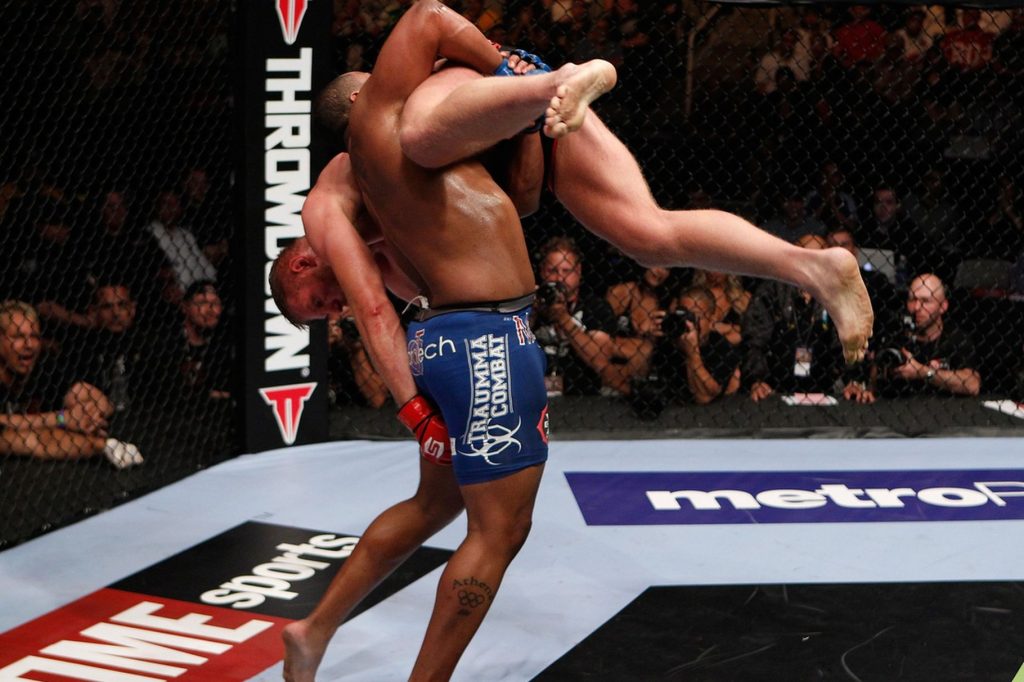
A swift sashay from alternate to semi-finals of the grand prix pit DC against the man who beat Fedor, Big Foot, much to the trepidation of a Cormier who was just short of the two-year anniversary of his debut. A cursory fist bump as the bell sounded spoke volumes about the polarity. Eloquently put, Silva’s hands were gigantic in comparison. However, something became noticeable, something that would become a hallmark of his career; Cormier grew. His aura takes life and adds to his presence. Despite apprehensions, Cormier felt at home against Silva; in fact, he dominated. Quick evasions while closing down on Silva’s range along with deadeye accuracy left his wrestling prowess largely unused as an uppercut sent the odds-on favourite crashing to the mat, making his way to the finals against Josh Barnett. Maintaining his stance as the aggressor, Cormier assiduously dismantled Josh Barnett, suffering a broken hand in the process, worth it. Daniel Cormier was here, and he belonged. The Strikeforce merger with the UFC took place in 2013 with Cormier beating Dion Sterling on their final card.
While entirely an uncharted territory for DC, he wasn’t a fish out of water. His teammate Cain Velasquez was ruling the division Cormier had entered. One thing to note, three years prior at UFC 121 which saw Velazquez beat the unyielding Brock Lesnar to capture the UFC Heavyweight title, Cormier was backstage. He was approached by someone who, with his comical yet competitive disposition, lauded Cormier for his wrestling before quipping with a challenge of taking the former Olympian down with ease. What may just have been a difference in perspective led to the start of a hostile link. That man – Jon Jones.
Out of the frying pan and into the fire for Cormier in his UFC debut as he took on former heavyweight champion Frank Mir. The laser-focused dash towards the octagon set the tone. The fight stayed on the feet for the most part with Cormier’s deft leg kicks and stout clinch control swinging the fight his way. Cormier’s intelligence and understanding of the sport was uncanny for someone with a relatively short stint. Take the fight against Roy Nelson for instance, former TUF winner and IFL Heavyweight champion with mallet-esque fists. Using his proficiency on the ground to neutralise Nelson’s striking, Cormier cleaned his exhausted opponent up on his feet in the later rounds.
The record was 13-0, edging ever so close to the Sun that was a title shot and Cain Velasquez was holding it. To Cormier, it was hardly a decision. He chose to drop down to the light heavyweight division rather than take on the cornerstone of his MMA career.
His first opponent was Patrick Cummins, who had a paltry period of ten days to prepare after Rashad Evans pulled out with a leg injury. In the brief lead-up to the fight, Cummins made the most of it, airing out training stories, bringing up the time he reduced his opponent to tears, a remarkably impressive move. Reasons are two-fold. In one fell swoop, Cummins managed to exponentially elevate the allure of the fight, while also ripping away any legitimate shot he had of emerging victorious. As per, Cormier drove through his opponent with an extra oomph in each strike.
Bullish showings against elite had become the norm for Cormier as a submission victory against Dan Henderson set up a title fight against a familiar foe, one with an ascent akin to none. The youngest UFC champion of all time, capturing the title at 23. A brutal display of skill leaving every opponent outclassed. An untouchable phenom – Bones.

The pot was on simmer long before the announcement. The initial moment of hostility, sponsor shenanigans, twitter wars, and just flat-out hatred. Initially set for UFC 178, the two squared off on media day. All went to plan. A respectful palaver regarding the upcoming bout… Nope, they brawled. All hell broke loose as Cormier shoved his opponent leading to an incensed Jones to rag-doll the mediator away and shoot straight for his nemesis. A venomous verbal skirmish followed the same day. Boiling point had been and gone. All that remained was the fight. After an injury to Jones elongated the wait, the fight took place at UFC 182.
Multi-faceted as they come, Jones eclipsed his opponent, finding success in the clinch and on the ground while using his range to curb Cormier’s assets. The first blemish on his record. A stray strike after the bell rang followed by a crotch chop; can they go five rounds more?
Jon Jones was incomparable in the octagon. Outside, however, he dealt with his infirmities. Jones was suspended after a reported hit-and-run charge with a vehicle driven by a pregnant woman. The news broke soon after Jones tested positive for cocaine metabolites. The title was laid vacant and Cormier went up against Anthony “Rumble” Johnson to stake his claim, doing so in his traditional prepotent way. Each win against the likes of Alexander Gustafsson and Rumble Johnson affixed Cormier’s name with the best in the division… theoretically. A stigma was attached to Cormier’s reign, a six-foot-four stigma returning from suspension. The back-and-forth was incessant. The rematch was scheduled for UFC 197 before Cormier had to drop out citing a foot injury as the reason.
UFC 200 was ideal. An ideal crescendo to a blood feud for the ages. The animosity was unlike anything the sport had witnessed. It all led to this.
Unfortunately, Jones was pulled from the event due to doping violations. Heartbreaking for both. For Jones, another stain on his otherwise surreal fighting career. For Cormier, the dissipation of the effort. It all seemed to be leading up to this. Redemption, an attempt to claim his place at the top. His reaction to the news was captured on camera as Dana White was handed the enviable task. For him, it was real. It was painful. Alas, it wasn’t to be, not yet.
Whilst Jones served his suspension, Cormier revelled in his ascendant ways. Jones served his one-year suspension. It was time.
“I beat you after a weekend of cocaine”
An encompassing statement by the former champion, an almost callous outlook on a rather sombre time in his life. Cormier snapped back with questions on how their fight may fall through again, a proportionate concoction of humour, disdain, and fear.
Anaheim, California. June 29th, 2017. UFC 214. The rematch.
Cormier was smart. He closed the fight down constantly, preventing Jones to use his range while connecting with precise strikes. Going into the third, Cormier was winning the fight. Jones, however, was predatorial. He bided his time. He set up the high kick. Flush. What followed was the chase, the push for the jugular. Cormier stumbled onto the mat as Jones followed with merciless strikes for the finish.
Jones wins, once again.
A heartbroken and confused Cormier stood in the octagon in tears. A brutal interview followed as Cormier tried to make sense of what was an abrupt finish to the rivalry. Cormier felt defeated or at the very least, indifferent. Jones tested positive for turinabol post fight and was suspended for a lengthier period as Cormier was reinstated as champion. The statement requires no pomp and circumstance. Cormier lost, putting an end to an entirely asterisked rivalry. Was the victor even relevant?
Regardless, it felt like change was abound.
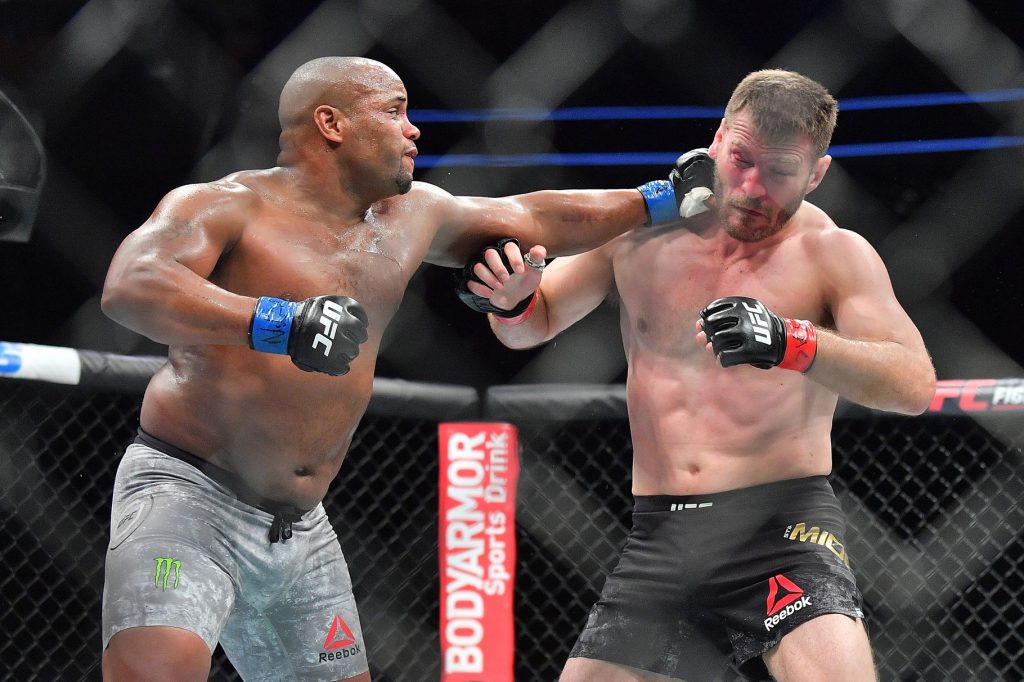
The heavyweight division, post a lull, was thriving with Stipe Miocic sitting cautiously on the throne, inevitably ascending in the all-time conversation. It felt right, finally making the switch back up to Heavyweight. DC was home. A clever move. A smooth break from a clinch with just enough space to land a right, one he had been setting up via conceding underhooks from the jump. A flurry of academic strikes.
And new.
An unfeigned display of rhapsody. Cormier stood atop the heavyweight mountain, no caveats.
A successful defence against Derrick Lewis made way for the rematch against Miocic. The bout at UFC 241 witnessed Cormier as his dominant self, hurling his opponent up and administering the fight at will. The fourth round saw an astute adjustment. Unguarded shots to the body gradually sapped away from Cormier. A stumble in his step saw Stipe pounce, ending the fight with ground and pound, game-plan and adjustment of the highest order. The trilogy is it. Regardless of the result, fans awaited a showdown between two of the most incredible minds in sport with stakes sky-high.

UFC 252. The same focus. The same dash. Cormier entered the octagon, one last time.
The clearest of the three fights, Miocic administered the proceedings, controlling his opponent in the clinch, aware of the underhooks. A severe eye poke on Cormier impaired the fighter. Ultimately, Daniel Cormier lost to Stipe Miocic.
… Loss. An unabating desolation of rationality. The anguish seeps through the conscience, leaving behind a chasm of ‘what ifs’ and ‘what could’ve beens’. For the fighters mentioned, a loss transcends the blemish on their record. It transcends the holding of a hand while the referee raises those of the victor. It transcends the post-fight interviews. Travail begets hope: Hope for restitution. A sense of understandable entitlement. Surely the ordeal will bear fruit, right?
Small city, big heart

An authoritative takedown stifled any plans Paige VanZant would have looked to employ as she saw herself struggling to regain her place in the fight. Amanda cinched in an armbar through deft transitions, marking the end of a swift contest. It was set up perfectly to elevate the Varginhas native to stake her claim as a contending prospect in front of arguably her largest audience. A pivotal juncture for the fighters, poignant for one, buoyant for the other. Her post-fight interview introduced the viewers to Amanda’s uninhibited laugh which lends aptly to her affable personality. Whilst fans revelled in her endearing demeanour, Amanda said this.
“I can prove to myself and to the world, doesn’t matter whatever you are, doesn’t matter who you are, what really matters is what you do with your life. I was training in my city, small city and nobody was trusting saying, “Oh, small city. How you can you beat the girl who trained in the big gym?” I have a big heart. So because of that, I put all my energy in whatever I do to come here and do my best”
What seems like clichéd anecdotes of truisms are anything but; in fact, it paints a vivid sketch of Amanda.
Amanda dreamt of representing her country in the Olympics. Her ability to bounce back from the career-altering injury cemented her character. A far-fetched concoction of resilience and luck led to her MMA journey and eventual signing by the UFC. An improbably grim start incites dread and hopelessness; not for Amanda.
Belief in the truth allowed her tenacity to flourish, taking every opportunity to evolve, opening up newer facets to her style and acclimating herself to the organisation. For Amanda, Conviction came before exoneration.
A rear-naked choke granted Amanda her first win in the UFC against Emily Whitmire, a moment commemorated on her father’s arm. In an interview with BT Sport, Amanda commented, “That was a moment in our lives, not just in my life or his life, because in the past, in my city, MMA fighters were like bad guys that fight in the streets. Now, my gym, my team, can prove that we are doing a great job. We are not just bad guys, we are fighters.” The omnibenevolence speaks about the clarity they possessed.
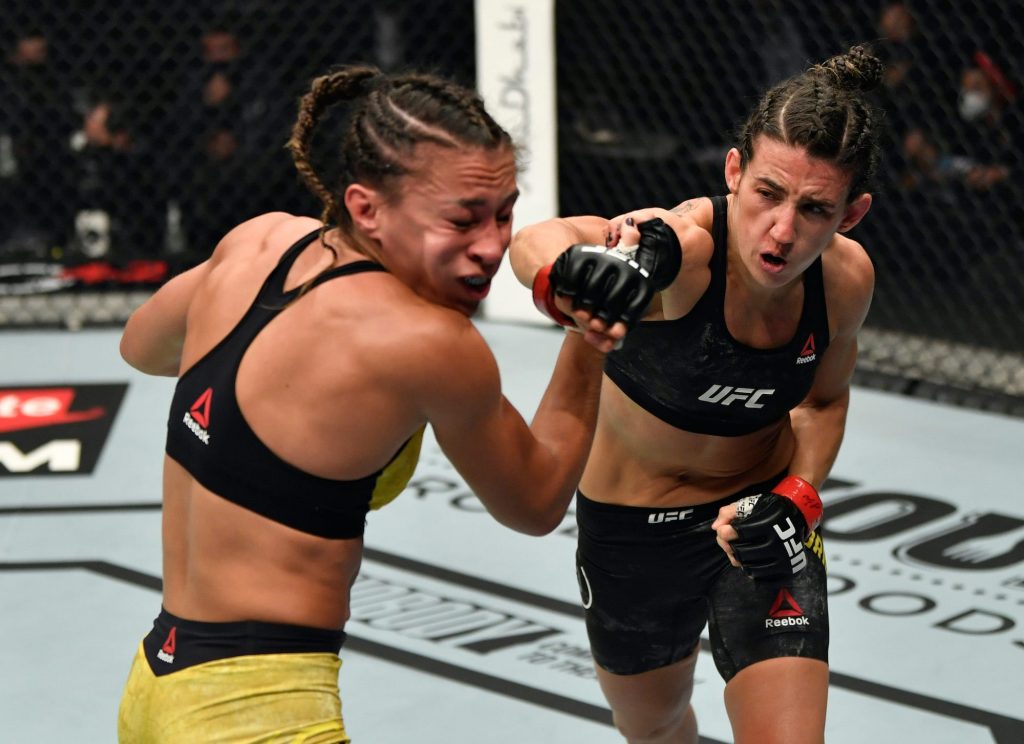
Amanda’s loss to Marina Rodriguez was a step back in her push for the gold, one she accepted with her infectious smile. Retrospection makes it rather onerous to think it would hamper her confidence.
“This isn’t tough, this is life”

The parched deserts of Tucson have a life of their own, assuming an identity that represents its citizens aptly. Dominick Cruz is all too familiar with the harshness of the climate and life alike. His father dealt with drug addiction. His mother and brother moved to a trailer with their grandmother living close by. The two ladies kept the boys on the straight and narrow. Hardships came in spades in the Cruz household. Time was of the essence with no time to wallow. Through adversity, Dominick imbibed the the essence of a river, moving in tandem with the current rather than question the flow. Learning the value of progressing regardless of the external intensified his mettle.
Dominick looked for an escape, a place to channel his energy into. He discovered wrestling in seventh grade in Flowing Wells High School. Coach Nelson and Coach Webber looked after the youngster as he honed his craft. Consistency in his lessons was key, a matter-of-fact view with the only goal being progression. It wasn’t as binary as it sounds. Coach Webber was more benignant, showing concern. Coach Nelson allowed no room to squelch in the rain, yet showed immense faith.
It is difficult to reflect on the career of Dominick without tracing the journey of his nemesis. Two winding paths that converged and diverged all too often in beautiful yet ironic rhythm. Going up a luminary in Urijah Faber as a mere footnote prompted the infamous signatures. Yet, through heartache and anguish, Dominick found himself atop the food chain, but not until he beat Faber. He tread with a chip on his shoulder, something he took solace in. A poignant loss to Cody Garbrandt leaving the former champion outclassed would rightfully evoke a sense of uncertainty and despair. A solemn Dominick stood tall in the post-fight press conference as cautious questions were directed at him. In a gripping display of identity, Dominick fielded questions regarding a “tough” loss.
“Loss is a part of life. If you don’t have loss, you don’t grow. This isn’t tough, this is life.”
Total ownership of his performance has empowered Dominick throughout his career, something he holds in high regard. It feels like the source of his resilience. In an almost remote take on his fight, Dominick spoke volumes about his beliefs. On Cody’s win and the emergence of a new champion, Dominick said this, “Try to keep it. It’s tough. Let’s see what you do with it.” Dominick revelled in his ascent and learnt the consequences of reaching the summit. His transition from young upstart to headliner saw him on the brutal end of an identical plot.
“The greatest moment of my life was when I realised I didn’t need the belt to be happy.”

Fighting was everything to Dominick. Injuries came in the form of an abyss, swallowing his dreams in an instant. While he was an enigma on the mic, cutting deep with the most unembellished tone, he hardly would have fathomed a job behind the desk. Injuries led Dominick to rethink not just his future, but his ideology. Sole focus with blinders on left him flailing. And with that, came an opportunity to showcase his acerbity as an analyst for Fox Sports One, imparting his idiosyncratic perspective in a way only Dominick can. From laser-point to a masterful juggler. Dominick fought harder yet more effortlessly with each setback as his understanding of life grew. As Urijah’s career drew to a close, the two men settled it post-fight with Dominick handed over a familiar poster. A handshake and a peace offering book-ended a feud for the ages.
The waters settled and ultimately, Dominick was the greatest bantamweight of all time and more importantly, Dominick was happy.
Daddest Man on the Planet

A myriad adjectives fit the bill when it comes to not just the career, but the life of Daniel Cormier. The Louisiana native had felt the brunt of debilitating misery; penury and loss alike. Yet, Daniel took inspiration at a time where repression seemed like the easy way out. He honours his daughter who unfortunately passed away before Daniel even made the world team, let alone the Olympics and his fighting career.
A luminescent wrestling career would have sufficed to place him amongst the prominent figures in sports. Daniel wanted more. At the age of 29, he began training for what was a bestriding career, sweeping past his opponents with freakish strength and accuracy. Daniel refrained from going up against Cain Velasquez, dropping down to light heavyweight despite a history of problems with weight-cutting, bringing a whole new meaning to the phrase ‘blood is thicker than water’.
A tornado struck in a seemingly paradisiacal fighting career in the name of Jon Jones, entrapping Daniel in an exasperating state of chaos. While the championship laid wrapped around his waist, Daniel carried a depleting weight of the two losses to his rival. Whilst a rivalry with razor-thin margins, Stipe Miocic triumphed over Daniel. Regardless, the victory in the first bout was a moment of clarity. Undisputedly the greatest, that was Daniel Cormier. A self reflective moment in the post-fight conference spoke volumes,
“It didn’t start with Jones. When I was 15 years old. I went to the world championships and got third. I was second in the NCAA championships to Cael Sanderson. In the Olympics Semi-finals, I lost to one of the 10 greatest wrestlers of all time to finish 4th and then to come and fight Jones and lose twice. I’ve come up short in a lot of situation but all those situations are earned. They don’t say, “well DC, you’re a great guy. We’re gonna put you in these great spots.” I’d just never been able to cash in. And tonight I was able to cash in. And it’s the most amazing thing. It almost feels like destiny.”
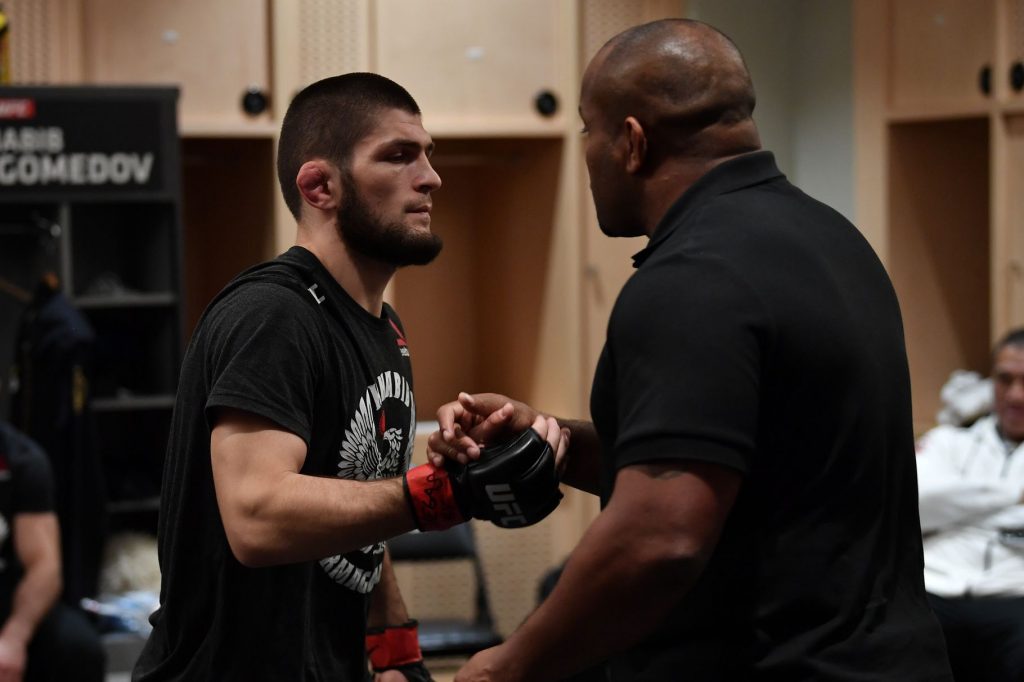
Destiny may be right, but it cannot take away from what Daniel has given to combat sports. A moment of reckoning. The UFC opened doors beyond fighting for Daniel. It gave him a voice, the ability to showcase his effervescent personality. From behind the desk to octagon interviews, Daniel had flourished beyond the realm of the sport. From Ariel HelVani to ‘I love you Luke’ to the ‘Daddest Man on the Planet’ to his ‘little brother’ in Khabib, Daniel enamoured sans the use of his limbs.
An important moment for Daniel came after his victory against Volkan Oezdemir at UFC 220 to retain the light heavyweight championship. To DC, after the loss to Jones, it felt like winning it all over again. Even in his moment, Daniel would be remiss to not mention the academy that nurtured him, including praise of his partners Khabib Nurmagomedov and Cain Velasquez.
A myriad of adjectives fit the bill; yet the one that stands out, is grateful.
For every fight that moulded him, for every person that willed him on, for every experience that shaped him, every loss, every setback, Daniel was grateful. And in reciprocation, fans around the world are grateful for an incredible career that made waves through cultures.
And as the Sun set in his fighting career with the dawning of the rest of his life, “So that will be it for me.” Hardly holds weight while his legacy continues to inspire. For fans, it will never be it.
Music finds a way to connect intangibles, a seamless tether. It lends to the elegance embodied by art.
The Foggy Dew by the Chieftains and Sinéad O’Connor finds its roots in the political history of Ireland. For the MMA world, the unmistakable rataplan of the drums and soul-stirring whistle speaks about the man who recast the mould of a superstar.
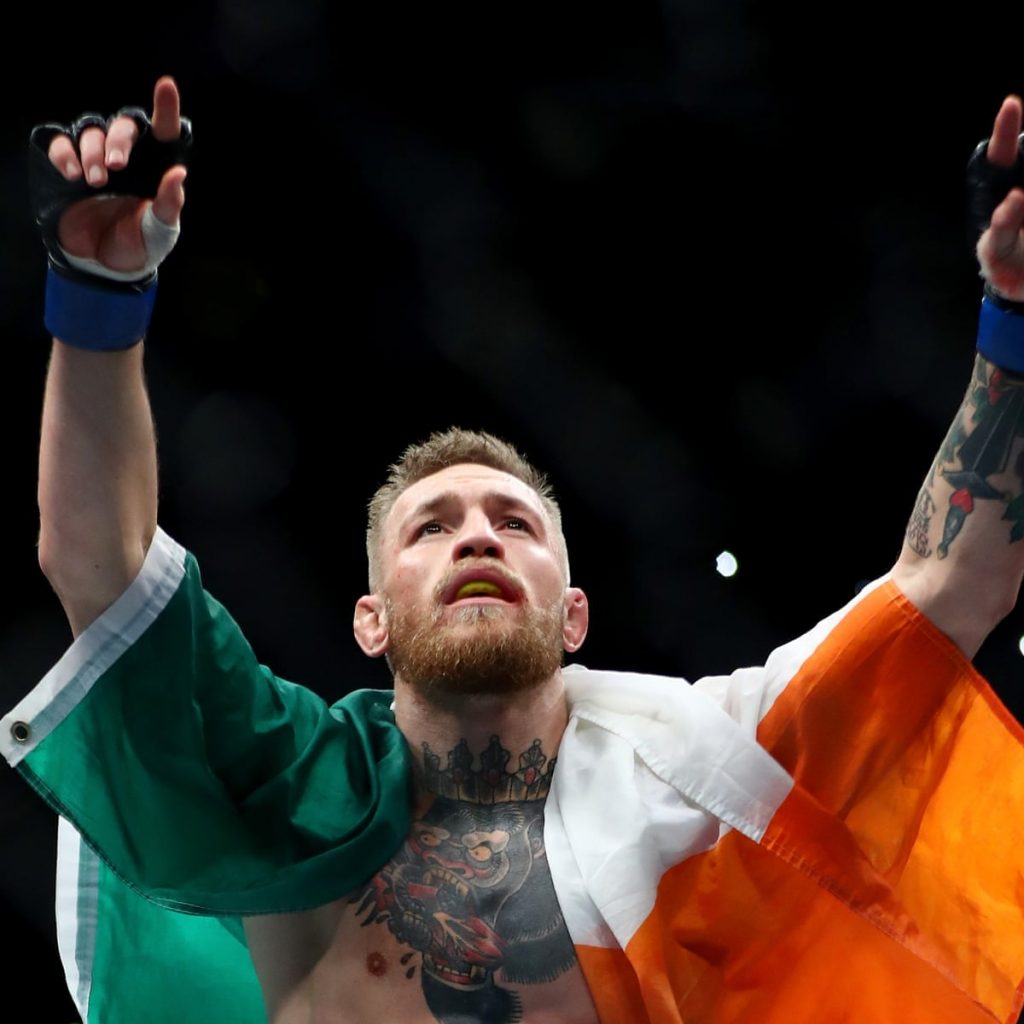
Conor McGregor lied in the heart of his country, personifying its ideology with a certain fervour. The boorish streets of Crumlin left him feeling thoroughly ill-equipped, leading him to start training. Fortunately, he realised he was pretty good at it. With a thought process incompatible with his father’s, back and forths regarding his future ensued with things coming to blows frequently; it did nothing to deter the unrelenting flame. A journey from fighting in beach shorts to a two-division champion for Cage Warriors endeared the Irishman to fans. They adored him. To them, the aura was palpable, though still in its infancy. One fateful day in 2013, UFC president Dana White made the trip to Ireland to receive an honorary medal from Trinity College. The place was deafening, for Dana at least. Conor McGregor was all he could hear, piquing the interests. Dana quickly realised, if the kid was half as good at fighting as he was at talking, they would have a star on their hands, just unsure of the magnitude.
What followed was ’60Gs baby’, an ACL injury, the takeover, Mystic Mac, the Interim championship, 13 seconds, a blemish, redemption, double champ, a 100 million dollar super-fight, Proper Twelve, a bus blitz, humiliation, fake retirements, scandals, Mr. Nice guy, No more Mr. Nice Guy and a telling loss.
And breathe.
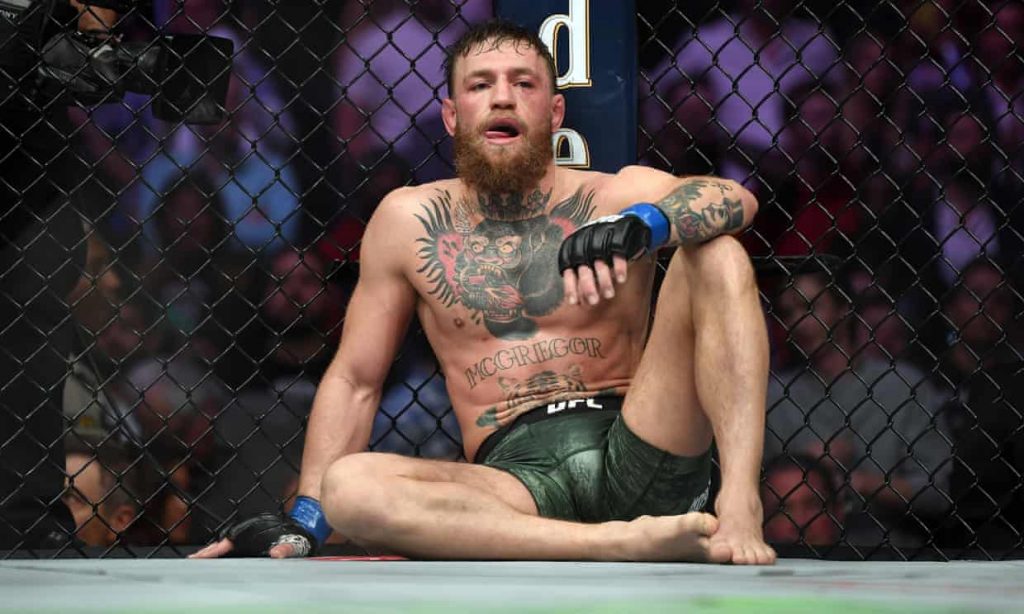
A raging tempest that was Conor McGregor surged forward, carried by his soaring ambitions. A 13 second victory over a 10-year unbeaten Jose Aldo to win the title wasn’t enough. Reclamation of the throne against Nate Diaz wasn’t enough. Becoming the first ever two-weight champion in the UFC wasn’t enough. Hell, a 100 million dollar boxing spectacle against arguably the greatest ever in Floyd Mayweather wasn’t enough, all while the persona of ‘The Notorious’ blurred the lines.
What started off as a venture for security turned into this lucrative juggernaut with little regard for balance. Controversy shrouded his wizardry. It came to a point where fans grew ambivalent towards the Irishman. His aura diminished. The Billi strut invoked less reverence. The kiss of death elicited less disquietude. In time, Conor McGregor lost his most potent weapon – Conor McGregor.
There is a lot to learn from the ebb and flow of Conor’s career. Humble beginnings but found the right people. Coach John Cavanagh became a voice of reason and understanding. His partner Dee Devlin worked tirelessly to propel Conor to realise his vision. The outpouring of emotions after his win against Chad Mendes spoke about the veracity of his character. The roar of a crowd means a lot to him. His roots germinated his congeniality, taking every opportunity to give back to the people that generated the wave he surfed upon.
At what cost, though? The now-famed question asked at the press-conference of UFC 257 regarding a quote from 2013, way before a title was on the cards,
“I’ve lost my mind doing this. Like Vincent van Gogh. He dedicated his life to his art and lost his mind in the process. That’s happened to me. But f–k it.
When that gold belt is around my waist and when my mother has a big mansion, when my girlfriend has a different car for every day of the week, when my kids have everything they ever want…then it will pay. Then I’ll be happy I lost my mind. I’ll die a crazy old man!”
A nostalgic chuckle before a morose look of contemplation graced his face as the quote was read out. The answer that followed was one of agreement and an onward look at the upcoming fight. Waiting by the fringes was never for the Irishman; yet, it’s where he finds himself.
A journey like his leaves no room for speculation about the road not taken. Agreement seems more like acquiescence. The sport which took his sanity is the one that offered him respite. A struggle for balance and relevancy may plague the mind, but why should it? Conor achieved it all in the sport. The tides seem to have subsided, leaving a legacy of unchartered greatness and familiarity.
In an immediate sense, Conor aided as a sublime segue for our fourth fighter, one who.. well, the road not taken seems apt.
Cue “The Boss – James Brown”
Paid in full

“I’ve never disliked somebody that much that I’ve fought”
A 16-3 Dustin Poirier did not mince his words regarding his opponent at UFC 178. He hadn’t granted any of his opponents a reprieve from his truculent demeanour. He had promise, with decisive showings against Max Holloway and Jonathan Brookins highlighting his reckless vein.
Growing up in Lafayette, Louisiana, Poirier went astray; indulgence and violence led to his dropping out from high school in the ninth grade and fleeting run-ins with the law.
What emerged from a rather turbulent time was an avenue. Dustin loved fighting. It was something he could expend himself for; something he could channel his belligerence into.
Going up against McGregor didn’t require a sounding of the alarms. With just three fights in the UFC at the time to Dustin’s ten, he saw his progression and experience as the ace up his sleeve and the fight as the crucial cog in his tryst with the gold. He expected the incendiary to try his utmost to get under his skin; perhaps overestimating his ability to weather the outspoken persona of Conor McGregor. A first round knockout was the prediction by the Notorious one, each verbal jab taking its toll.
By the time fight day arrived, Conor was composed, blissfully aware of the dais he stood upon. Poirier was angry; Conor wasn’t.
A devilish smirk from the Irishman as Herb Dean performed his due diligence kept painting the picture.
Poirier felt the fight come to him with a hook kick. Every motion from him was commented on, a shrug of disappointment to words, every reaction stirring the emotion. McGregor closed in with a sublime left, sending Poirier down. A minute, 46 into the first round, Conor McGregor beat Dustin Poirier, birthing ‘Mystic Mac’ and leaving the Lafayette native… lost.

What was just another junction for the hype train turned out to be a moment of clarity amidst heartbreak. In retrospect, Dustin was aware of the corollaries from that night,
“The Conor fight was one of the biggest turning points in my career,” Poirier said. “I stopped listening after that. What happens when you listen to that stuff is, it makes you overthink and you create problems that aren’t there. It does you no good.”
The realisation showed with each bout bringing a better Poirier as he went up to the lightweight division.
Poirier fit snuggly. Two consecutive finishes against Carlos Diego Ferreira and Yancy Medeiros followed by a decision victory against Joseph Duffy displayed a more pragmatic Poirier, his salvo of strikes curated.
Bobby Green attempted the verbal incision and was rewarded with a first round overhand left for his troubles.
Something was happening, unruffled and purposeful, Poirier finally felt in-charge.
Well, until he faced Michael Johnson. Another hitch reared its head. Prior to the fight, Poirier played his opponent’s acumen down, similar to his approach to the McGregor fight. Mild arrogance resulted in a first-round knockout. Another setback, once again, a hurdle he set up himself.
While UFC 178 felt like the turning point, an overhauled Poirier showed up for the Jim Miller fight. On the face of it, a salon-quality head of hair and most importantly, the responsibility of being a father. A calmer aura emanated from him, not hanging by the thread of a win or a loss. A gritty decision against a stalwart in Jim Miller felt like the start of something. Gritty became a staple for the opponents Poirier faced thereafter. Anthony Pettis and Eddie Alvarez offered offensive threat that a younger, more prone Poirier would have struggled to endure. The Justin Gaethje bout epitomised his acuity, working around the formularised offensive style.
The doubts had diminished. With each stunning performance, Dustin soothed the nerves of fans and Dustin’s alike. Having proven himself to be a steadfast contender for the title, the moment felt imminent. In 2019, at UFC 236, Poirier would take on a former foe in Max Holloway for the interim UFC Lightweight Championship.
A discernible buzz ran through the arena that night. Two of the most prolific strikers stood toe-to-toe, both in utterly different places in their careers and lives since the last time they fought. Neither man afraid of staying in the pocket and engaging in a slugfest. The initial control Poirier procured started to slip as Holloway grew in stature. This meant too much to Poirier for him to flow with the river. While his opponent flaunted his volume striking ways, Poirier struck harder while evading the rhythm efficiently. The bout went the distance and this time, it was Diamond’s night. A cathartic roar as the belt was wrapped around his waist meant everything, a lifetime in the making.
The two men had nothing for respect each other. In the post-fight interview, Dustin dedicated the win to his wife Jolie.

She took him to his first amateur fight in Arkansas, a six-hour drive from Louisiana. They got married the year Dustin turned pro.
Dustin has never lost consecutive fights, incredibly showing tangible growth with each setback. For Dustin, a loss was devastating as it gets – yet each time, he bounced back. His wife provided a constant, an unrelenting belief that picked him up when he felt broken.
Physically, Dustin was consistent with progression. Coached by an astute mind in Mike Brown propelled him as a fighter. Coming back from crushing losses and beating former world champions requires an iron-clad mettle, however.
Just behind Michael Bisping, Dustin Poitier’s ascent to a title fight was the second-longest in UFC history. Instead of harbouring frustration, he revelled in the tougher route. Each lesson was paramount, preparing him for the fight ahead – and prepared was something he needed to be.
27-0 at the time, draining each of his opponent gradually of their glimmer of hope. Khabib would be a fight like no other. At UFC 248, the long-awaited tryst took place.
An unsurprising start saw Khabib stifle his opponent. Heavy strikes to create space for a neck crank pulled Poirier into the aforementioned deep waters. He survived, however.
The second round, one would expect more of the same. Khabib’s awkward movement denied any opportunity to get an exchange going. There was a moment, just one. A right hand as the champion backed up allowed more strikes. Khabib was rocked. A collective gasp went around the world as Poirier had the champion threatened. Early on in the third round, with his back to the cage, Poirier cinched in a guillotine choke – a leg over his opponent’s back and a deep hold. His face telling the story. He needed this. This was everything. His decision to not go with the full guard allowed the champion to roll out. Almost instantly, Khabib took control and transitioned to the back. He found the choke. Poirier tapped. And still.
A transient moment in the backdrop of celebrations saw a kid ask Dustin, “Where is the pain?” as he pointed to his eye. The reply was a point to the heart.
His tears after the fight bear testament to his passion.
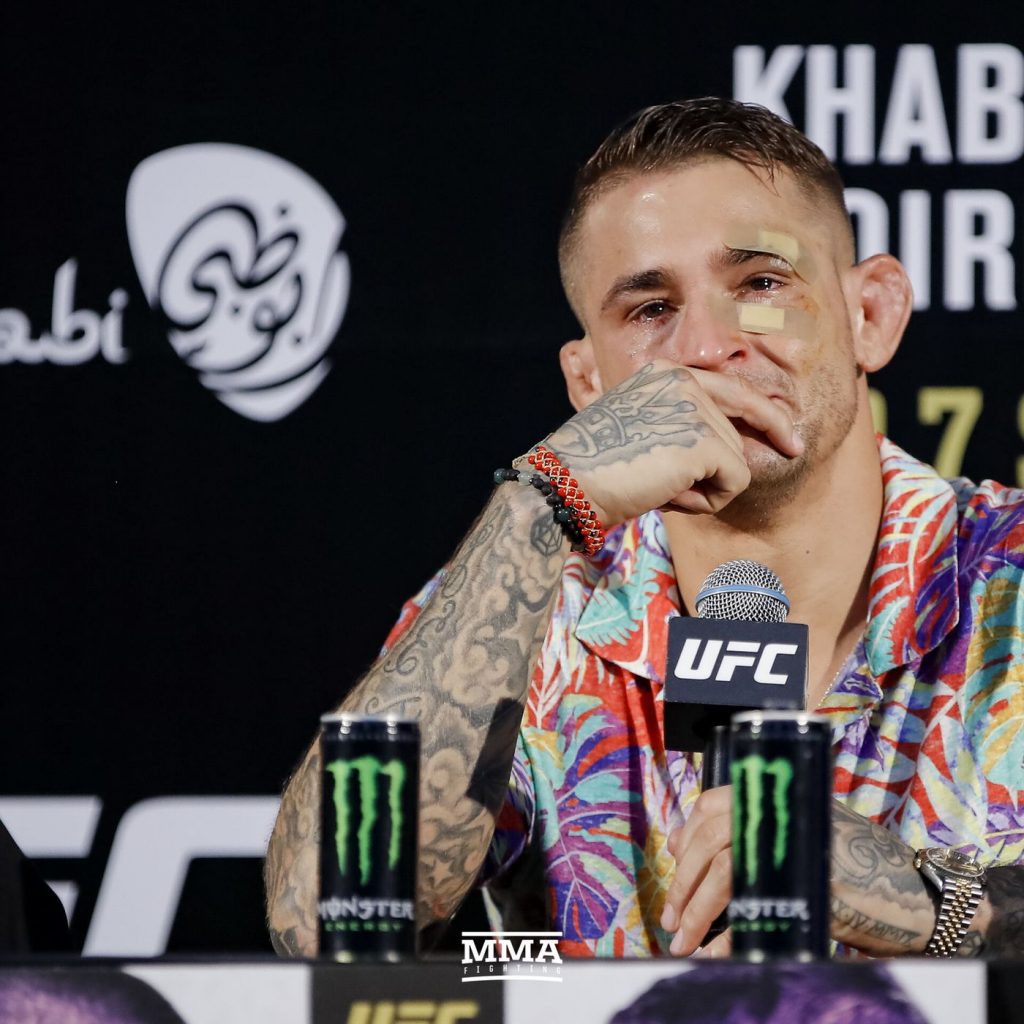
For him, it was destiny. On a journey of highs and lows, he wanted something to signify its validity. The title was the destination. And to him, he failed, perhaps with the knowledge of hindsight saying he could have done more.
After the fight, it was back home to Louisiana, to his family. No matter whose hands get raised at the end of the night, Dustin had peace.
Fighting may have been the means – a harsh teacher, but Dustin was a good person. The Good Fight Foundation helps people all around the world. The brutality of the sport blossomed philanthropy.
Yet another fight of the year contender against Dan Hooker left things open-ended. A ribbon was necessary, not for his career, but for the journey that changed his life; the proverbial end of a chapter. There was just one man for the job – Conor McGregor.
The winding roads converged for the two to meet. No bad blood, just mutual respect. Insults were replaced with compliments. Stare-downs across a hall were replaced by donations for a good cause.
The contrast was still there though. For two weeks, Poirier was trapped in the hotel and in his mind. McGregor arrived in style, the only way he knows how, on his stellar yacht. Poirier was zoned in.
On January of 2021, ‘The Boss’ blared through the arena as Poirier made his walk to the octagon. In the first round, McGregor exhibited his marksmen striking. Poirier’s defence had improved significantly, using his shoulders to evade or absorb the brunt. Fate clearly loves irony as Poirier had his share of taunting to do. He kept throwing leg kicks which, to the Irishman’s stance, were hammers to the calf. All seemed fine at the end of the first. Trouble was afoot in the second.

The leg kicks were causing damage. McGregor’s stumbled as his hands attempted to make up for it. A counter right sent Conor into panic mode with no time to react. A barrage followed, the trusty barrage that has won him multiple fights, embodying his journey. It was a poet’s dream. McGregor hit the ground and that was it.
An impassive Poirier raised his hands as the world watched slack-jawed.
“Yeah, I’m happy man, but I’m not surprised. I put in the work.”
Quite telling. Dustin, in his journey, learnt belief, an understandable belief beaten into him by life.
And finally, he stands tall. Top of the mountain. The Diamond shines. Paid in full.
Barbaric. Feral. A mindless hippodrome of sadism. MMA stands as the antithesis of its notions. In each fighter lies a story, finding kindred homes in hearts and minds. The record-books barely scratch the surface of its benevolence and perseverance. Art paints a picture of reality through losses that transcend the octagon, and in crimson and translucent shades emerges a masterpiece – life.



